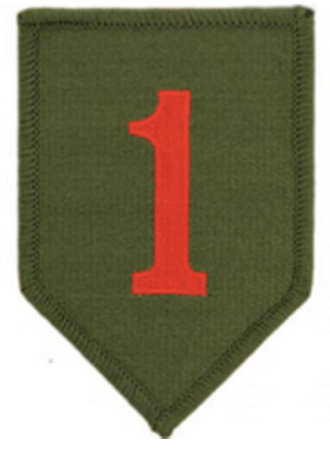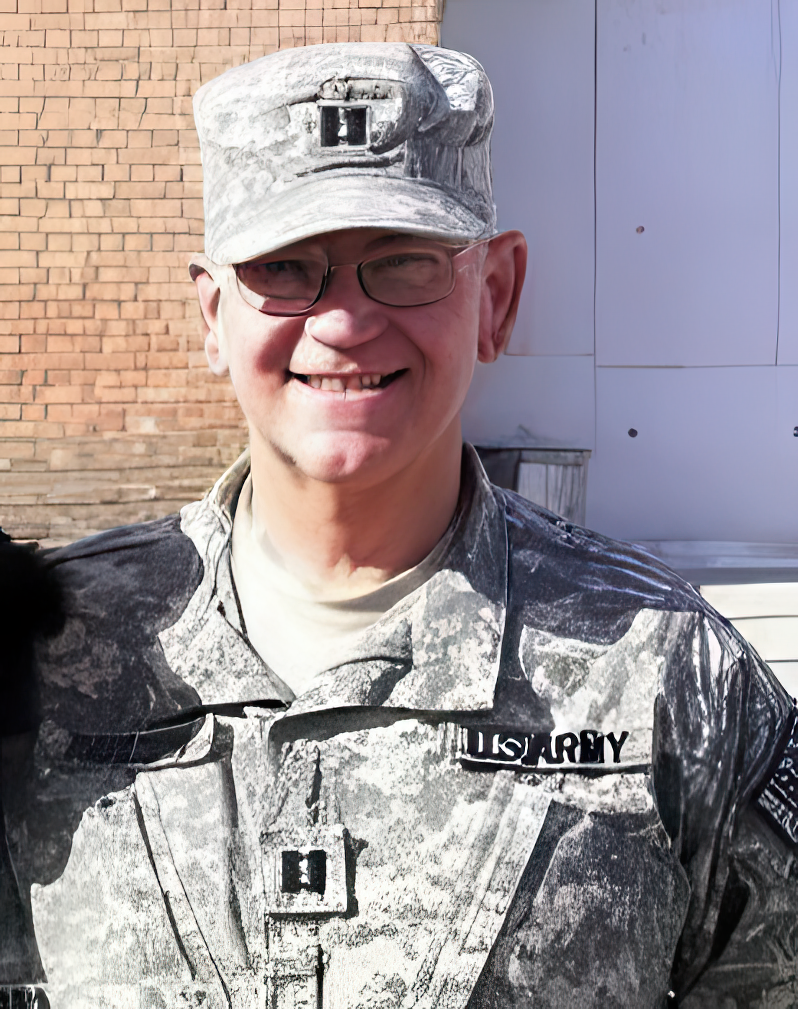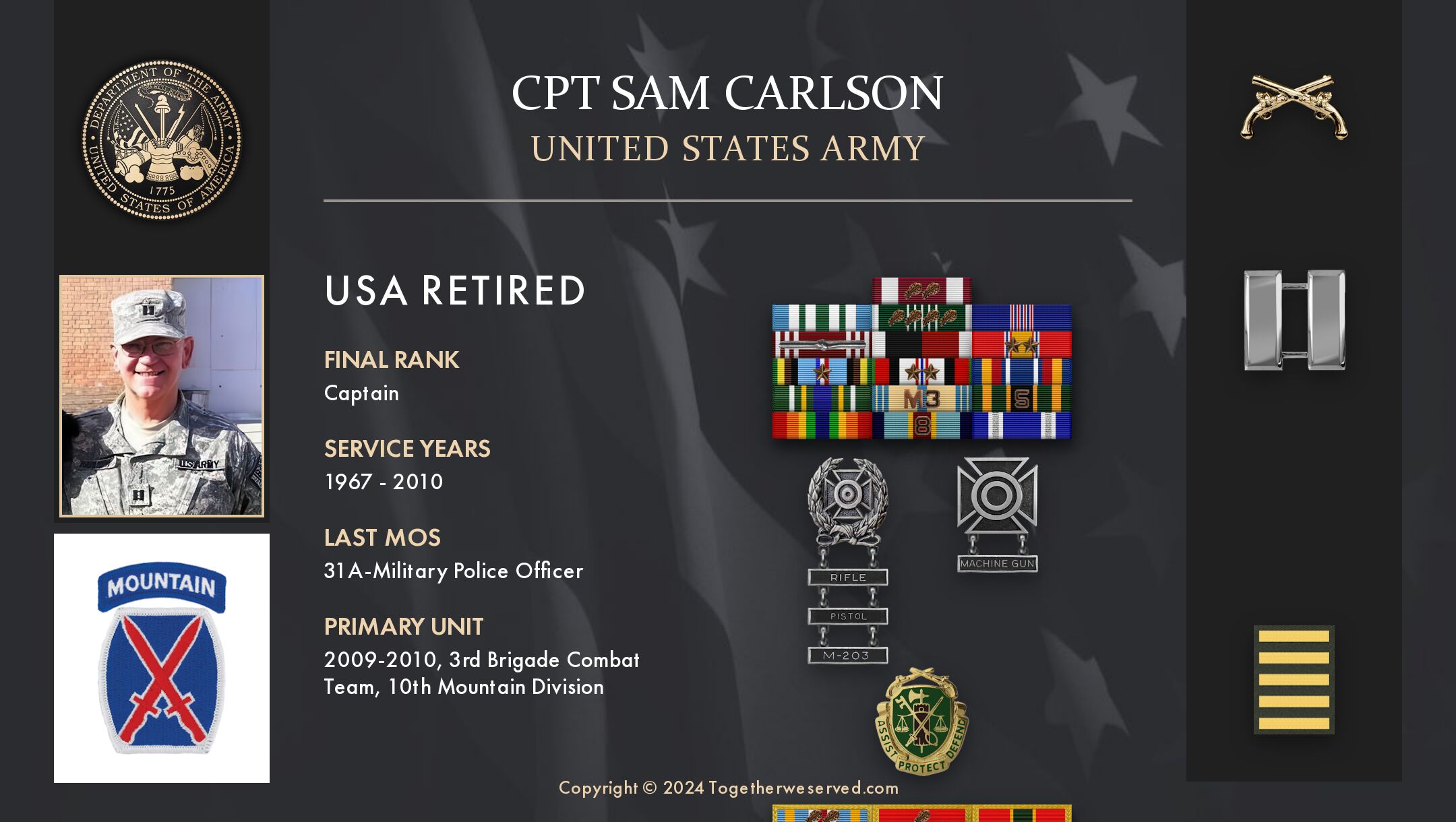PRESERVING A MILITARY LEGACY FOR FUTURE GENERATIONS
The following Reflections represents CPT Sam Carlson’s legacy of his military service from 1967 to 2010. If you are a Veteran, consider preserving a record of your own military service, including your memories and photographs, on Togetherweserved.com (TWS), the leading archive of living military history. The following Service Reflections is an easy-to-complete self-interview, located on your TWS Military Service Page, which enables you to remember key people and events from your military service and the impact they made on your life. Start recording your own Military Memories HERE.
Please describe who or what influenced your decision to join the Army?

My father was a career soldier, enlisting as an Infantry Private in 1937 and retiring as a LtCol in 1963.
As an Army Brat and as far back as I can remember, joining the military was always something I had in my mind to do.
For a while, I thought that goal was out of reach since I married and had a child and was not eligible under the enlistment criteria in place at the time. With the helpful advice of an Army Recruiter in Tacoma, Washington, I found two ways to enlist. The first was to join the National Guard and, while in Basic Training, I could transfer to the Regular Army. The only other alternative was to volunteer for the draft and reclassification to 1A. Upon reclassification to 1A, I would be allowed to enlist. I visited the National Guard Armory in downtown Tacoma, Washington, and spoke with a CWO and told him what I was trying to do. He showed me his status board and advised that there was a six-month waiting list to enlist in the Guard. I opted for the Draft reclassification and wound up in Basic Combat Training about two weeks later. During my second or third week of Basic, I received a draft notice and a letter of acceptance from the CWO for enlistment in the National Guard. From the recruiter and the CWO, I learned that there is always a way to make things happen.
Whether you were in the service for several years or as a career, please describe the direction or path you took. What was your reason for leaving?

Normally, when asked about my career path, I give this “Reader’s Digest” version: “I enlisted as an Infantry Private. I rose to First Sergeant and got “busted” down to Second Lieutenant and retired as a Captain.”
The following is the long version of my story:
After Basic, I was assigned to Tiger Land, Fort Polk, Louisiana, for Light Weapons Infantry Advanced Individual Training. I was selected as Trainee of The Cycle and wound up remaining at Fort Polk and helping train the next cycle of Infantry trainees. After that cycle graduated, I was transferred to the 6th Infantry Division, which had been recently reactivated and was forming up at Fort Campbell, KY.
Several months later, I was approached by my unit career counselor for an opportunity to take a short reenlistment for intelligence duties. Not long after, I found myself assigned to an intelligence unit at Oberursel, Germany, starting a new career path as an Intelligence Coordinator and attending intelligence operations and German language school. In 1971 I was sent to the Counterintelligence Special Agent course, followed by the Defense Language Institute and a technical intelligence course. I later served in intelligence units at Fort MacArthur, CA, and The Republic of Korea. In 1975 I was assigned to the 9th Infantry Division and in 1977 to the 11th Armored Cavalry Regiment’s 2d Squadron at Bad Kissingen, Germany. While serving as the Squadron’s Border Operations NCO, I applied for and received a direct commission as second lieutenant, USAR, becoming a Dual Component NCO/Officer. Soon thereafter, I was reassigned to the 3d Armored Division in Frankfurt. Upon completion of my European tour, I was assigned to the 1st Infantry Division at Fort Riley and then to Munich, Germany, in late 1981. A year later, I was selected for a special assignment to Central America, returning to Germany in mid-1983 and on to an assignment with the Berlin Brigade. I returned to the USA in 1985, attended a couple military schools, and was sent back to Central America, returning to the USA in mid-1986. I retired in late 1987.

The day Iraq invaded Kuwait, I called the Army’s Retiree Mobilization Branch and volunteered for recall to support any operations for which I might be needed. I finally received notification that orders were coming as the ground war started. The ground war ended so fast that I did not get to deploy, and all recalls were canceled. As kind of a “consolation prize,” I did wind up in the TX Guard, initially as a Military Police Battalion Executive Officer and eventually selected to command the battalion, receiving State AG promotions to Major and Lt Colonel before I left the Guard in 1995 to relocate to Wisconsin.
In September 2001, after finding that my sister-in-law survived the attack on the WTC building in which she worked, I called the Army’s Retiree Mobilization Branch and again volunteered for active duty. In about November 2004, I received a call from the Intelligence and Security Command, inquiring if I’d consider a recall to command one of their intelligence units supporting Operation Noble Eagle. I was recalled to active duty in 2005 in my permanent retired rank of Captain and served two additional years of active duty in CONUS commanding the intelligence unit. I retired again in May 2007, only to be recalled to active duty again about three months later for deployment to Afghanistan with CJTF-82 ad CJTF-101. I returned to the USA in 2008 and retired again. Six months later, I was recalled again and sent to Fort Drum, NY, to deploy with the 3d Infantry Brigade Combat Team, 10th Mountain Division, serving that Brigade at FOB Shank, FOB Airborne, and Camp Dubs. I returned to Fort Drum upon completion of the deployment and retired again in March 2010.
If you participated in any military operations, including combat, humanitarian, and peacekeeping operations, please describe those that made a lasting impact on you and, if life-changing, in what way?

Official acknowledgment of our operations in Central America during the early 1980s did not come about until about twenty years afterward.
I had two deployments on Operation Enduring Freedom, serving at Bagram Air Field during my first deployment. I managed to get out of Bagram three times… to Kandahar, Camp Phoenix, and to Salerno. I served with CJTF-82 and CJTF-101.
Six months after my return from Afghanistan, I found myself redeploying back to Afghanistan from Fort Drum with the 3d IBCT, 10th Mountain Division. I was in the provinces of Wardak and Logar (FOB Shank, FOB Airborne, and also Camp Dubs). I was on the receiving end of rocket and mortar attacks, some small arms fire, and one IED strike. However, I did not actively participate in offensive combat operations, other than from a Battalion or Brigade TOC as an S2/S3 battle captain.
I am particularly proud to have served in Afghanistan with Task Force Spartan, 3d IBCT, 10th Mountain Division (Light Infantry). That was one of the best units I ever served with.
Of all your duty stations or assignments, which one do you have fondest memories of and why? Which was your least favorite?

Of the many units I was assigned to, I can confidently say the ones I have the fondest memories of were the following:
9th Infantry Division, Ft Lewis WA (75-77). I naturally loved Ft Lewis. I was born there, and the adjacent city was my hometown. The 9th Infantry Division at the time was extremely active, and we spent a lot of time in the field training at Ft Lewis or at Yakima. The Division CG at the time was MG (later GEN), Volney Warner. He gave us a lot of room to experiment and make mistakes in training that we would not make in combat.
2d Squadron 11th ACR (77-78). This was a hard-charging unit with an active recon and surveillance mission adjacent to the East German Border. I was placed in a position to play an extremely demanding role supervising the Squadron’s mission.
During 1982-1983, I was sent to Central America to be with a ragtag bunch of soldiers who were performing an important combat support mission in El Salvador/Honduras. It wasn’t until a little over 20 years later that I was allowed to say I was there and finally get ‘credit’ for the deployment.
2009-2010 – Deploying with the 3d IBCT, 10th Mtn, back to Afghanistan was a great assignment with a great unit and people. Because of them, I felt I ended my long career on a very high note, serving with some outstanding Soldiers.
From your entire service, including combat, describe the personal memories which have impacted you most?

There is no one single memory, but a collection of memories of the periodic absolutely outstanding Soldier, NCO, or Officer I had the honor to learn from or the pleasure to serve with.
Of all the medals, awards, formal presentations, qualification badges you received, or other memorabilia, which one is the most meaningful to you and why?

The first for which I had immense pride was the blue infantry cord after completing Infantry Training at “Tiger Land,” Fort Polk, in September 1967.
Each subsequent award received between that time and my most recent retirement in 2010 had some special meaning to me. Those with the most meaning didn’t have the event, achievement, or service associated with it, but who submitted the award and/or from whom I received it.
Which individual(s) from your time in the military stand out as having the most positive impact on you and why?

There were too many, I can’t select just one. First, there were my Drill Sergeants in Basic Combat Training at Fort Lewis, WA. After that, there were two from “Tiger Land,” whom I learned so much from not only their training but also from the examples they set. They were the Company Commander, Cpt Glenn H. Mutter (R.I.P.), and SFC Joe Crosby. Others I admired were MG Volney Warner, Col William D. Neal, Jr., and Col J. Barry Williams (R.I.P.). I also had the pleasure to work a project in Central America with Col James N. Rowe.
Without a doubt, the one person in my life who had the greatest influence would be my father, LtCol Carsten D. Carlson I. Besides being a great father, he was an outstanding Soldier, NCO, and Officer who loved the Army and always set the example for others to emulate. He gave me the appreciation that a good unit was like family, not only for the Soldiers but their family members as well. I experienced this feeling of the family during his Regimental assignments, then again with the Spartans (3d IBCT, 10th Mtn Div).
Can you recount a particular incident from your service, which may or may not have been funny at the time, but still makes you laugh?

I have many, but most of these stories should not be shared in a public forum.
A recent event happened during my first deployment to Afghanistan. I had just joined CJTF-101 and was sitting in my area for a shift change. There was a young Soldier sitting next to me who mumbled, “Samuel Carlson, Samuel Carlson.” Then, “Sir, are you any relation to another Samuel Carlson in the Army?” I replied, “There are only two Samuel D. Carlson’s in the US Army, me and my son the First Sergeant.” The Soldier replied, “In Korea?” I answered, “First Tank!” The young Soldier sat straighter and said, “He was MY First Sergeant!” I answered that with, “You know, between the two of us, he is the NICE one!” The poor Soldier slumped down into his chair and groaned, “OH GOD!”
What profession did you follow after your military service and what are you doing now?

From my first retirement in 1987 until 1995, I worked in Defense Special Projects with Texas Instruments and General Dynamics. Because of the cutbacks during the Clinton Administration, I worked for a couple of years as the Director of the JOBS program and welfare reform in Wisconsin. I then moved to Lockheed Martin to work international programs security. I took a military leave of absence from Lockheed during my three retiree recall periods between 2005 and 2010. I retired from Lockheed in June 2010.
My only “job” now is being a Dad and Grandpa, and periodically performing with the reunited Rock n Roll Band I had in the 1960s. I started school at Kennesaw State University (KSU) in the Fall of 2012. I’m not going for another graduate degree, but to use the Post 9/11 GI Bill to take the fun and interesting undergrad courses.
I only used six months of my Vietnam GI Bill before I finished my Master’s program. Those six months were subtracted from my Post 9/11 GI Bill benefits. I’m mostly concentrating on foreign languages and history at KSU, and at my age, I am also enjoying playing the part of Rodney Dangerfield in the movie “Back to School.”
What military associations are you a member of, if any? What specific benefits do you derive from your memberships?

I am a life member of the Black-horse Association (11th ACR) and the VFW. I am also a member of the Associations of the 1st Infantry Division, 3d Armored Division, 6th Infantry Division, 9th Infantry Division. American Legion, IAVA, and the 10th Mountain Division.
I have not been very active in any of the organizations or associations, with the exception of my local American Legion Post #304 in Kennesaw, Georgia. It is a very active Post, and I serve as one of their volunteers to man our Veterans Information Referral Office, assisting veterans/families with benefit information and direct referrals to the VA.
In what ways has serving in the military influenced the way you have approached your life and your career? What do you miss most about your time in the service?

My service has made it so much easier for me to work with different people who have different skills, education, backgrounds, and abilities.
In my civilian life, I find it difficult to get too excited about the little things that go wrong. They are normally easy fixes. The big problems just take a little more planning and action to fix.
Based on your own experiences, what advice would you give to those who have recently joined the Army?

No matter how knowledgeable and experienced you think you might be, you will always have more to learn. Savor every moment of your time in the military. It will be extremely rare to experience in the civilian world the same friendships, teamwork, and camaraderie you find in the military.
In what ways has TogetherWeServed.com helped you remember your military service and the friends you served with?

Togetherweserved.com has helped me find so many old friends, make new ones, and maintain contact with them. The military is much more than a uniform, a specialty, or a rank; it is a unique and bonding way of life as shown in the many pages of this site.
PRESERVE YOUR OWN SERVICE MEMORIES!
Boot Camp, Units, Combat Operations
Join Togetherweserved.com to Create a Legacy of Your Service
U.S. Marine Corps, U.S. Navy, U.S. Air Force, U.S. Army, U.S. Coast Guard

0 Comments